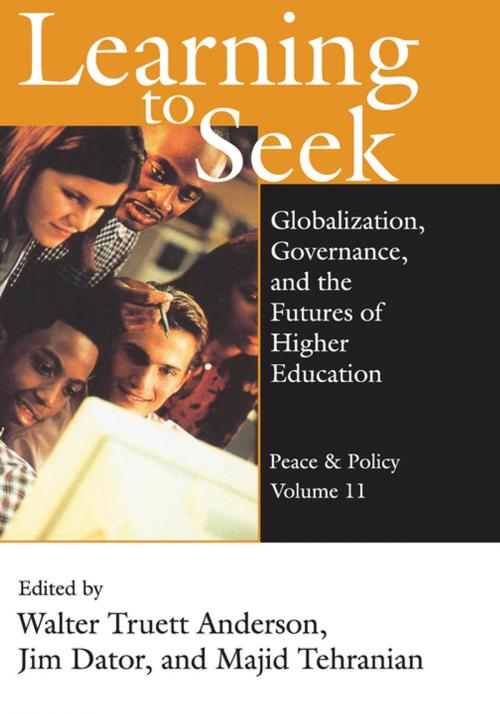Learning to Seek
Globalization, Governance, and the Futures of Higher Education
Nonfiction, Reference & Language, Education & Teaching, Higher Education, Social & Cultural Studies, Political Science| Author: | ISBN: | 9781351509251 | |
| Publisher: | Taylor and Francis | Publication: | July 12, 2017 |
| Imprint: | Routledge | Language: | English |
| Author: | |
| ISBN: | 9781351509251 |
| Publisher: | Taylor and Francis |
| Publication: | July 12, 2017 |
| Imprint: | Routledge |
| Language: | English |
The accelerating technological transformation in learn- ing has necessitated an ability to search and differentiate among the one billion web pages, libraries, databases, books, newspapers, magazines, radio and television stations, and opinion columns available online. This volume focuses on the normative challenges that the current technological transformation presents to all professionals engaged in higher education. Part I concentrates on the current social and technological trends. David Snyder presents an outline of technologies that have made open knowledge systems possible. Majid Tehranian argues that the new technological environment has made learning to seek out information more possible than ever before. Robert Fuller calls for an egalitarian rather than hierarchical approach to communication systems. Harlan Cleveland proposes integrative learning, broad thinking, and globally aware citizenship through "education for wisdom." Part II focuses on problems of governance and finance in the new technological environment. John Hinchcliff takes up the problem of values and argues for the maintenance of traditional altruistic rather than Promethean goals. Karou Yamaguchi comes to the problem of the futures with the tools of system dynamics. William Bergquist calls for a reorganization of higher education to meet the needs for creation, transfer, and inculcation of knowledge and skills. Hamid Shirvani calls for the core values of transparency, integrity, open communication, and dignitarian approach as the guideposts in educational leadership. Walter Truett Anderson concludes by attempting to bring the complex technological, social, economic, and political variables into a holistic approach for the management of higher education. In 2005, at the Universities of the Future Conference, participants were asked to envision the future of higher education. Part III, presents their visions.
The accelerating technological transformation in learn- ing has necessitated an ability to search and differentiate among the one billion web pages, libraries, databases, books, newspapers, magazines, radio and television stations, and opinion columns available online. This volume focuses on the normative challenges that the current technological transformation presents to all professionals engaged in higher education. Part I concentrates on the current social and technological trends. David Snyder presents an outline of technologies that have made open knowledge systems possible. Majid Tehranian argues that the new technological environment has made learning to seek out information more possible than ever before. Robert Fuller calls for an egalitarian rather than hierarchical approach to communication systems. Harlan Cleveland proposes integrative learning, broad thinking, and globally aware citizenship through "education for wisdom." Part II focuses on problems of governance and finance in the new technological environment. John Hinchcliff takes up the problem of values and argues for the maintenance of traditional altruistic rather than Promethean goals. Karou Yamaguchi comes to the problem of the futures with the tools of system dynamics. William Bergquist calls for a reorganization of higher education to meet the needs for creation, transfer, and inculcation of knowledge and skills. Hamid Shirvani calls for the core values of transparency, integrity, open communication, and dignitarian approach as the guideposts in educational leadership. Walter Truett Anderson concludes by attempting to bring the complex technological, social, economic, and political variables into a holistic approach for the management of higher education. In 2005, at the Universities of the Future Conference, participants were asked to envision the future of higher education. Part III, presents their visions.















